In California’s San Fernando Valley, what seems like a simple mobile home surrounded by tents and booths provides so much more. It is an oasis, providing critical medical care for people from all walks of life thanks to the dedication of two physician assistants.
Karla Rugamas, PA-C, MCHS, founded the Vida Mobile Clinic with longtime friend and colleague, Ana Ruiz-Peña, PA-C, MHA, in May 2020. After meeting each other at physician assistant school, Rugamas and Ruiz-Peña found a connection through their similar roots and passion for health.
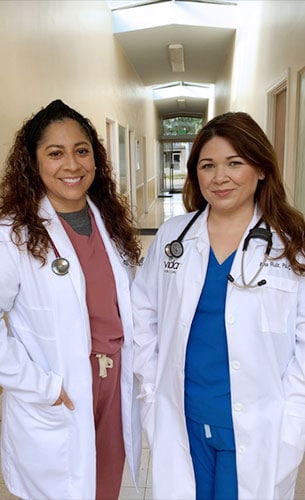
Karla Rugamas and Ana Ruiz Peña,
founders of Vida Mobile Clinic
Free clinics have been crucial for both Rugamas and Ruiz-Peña since childhood, as they often didn’t have access to healthcare. Ruiz-Peña’s father, an immigrant who spoke Spanish as his first language, was diagnosed with lung cancer when she was just a child. He couldn’t communicate his needs to his healthcare providers, and she would often take on the role as his translator. She was only 13 years old when he passed away and his death is one of Ruiz-Peña’s primary inspirations for starting the Vida Mobile Clinic.
Rugamas was raised by two immigrants from El Salvador. Her parents struggled to survive while working two to three jobs at a time. She and her family were also uninsured, often visiting free clinics when she was growing up. At 14, while volunteering for hospitals, Rugamas became interested in working as a PA in her community.
“Just like Ana, I grew up knowing what a doctor is and a nurse is, so I thought they were my only options,” says Rugamas. “When I found out what a PA did and the flexibility of working in different specialties I was like ‘Wow this is really cool.’ “
Rugamas and Ruiz-Peña discovered that they each shared the dream of opening their own clinic.
In 2017, the pair officially teamed up and filed paperwork to begin the journey to opening a nonprofit. Rugamas and Ruiz-Peña both maintain a full-time work schedule outside of the clinic. Their days off are devoted to Vida.
Beyond the usual challenges of starting a nonprofit, Vida Mobile Clinic faced the daunting task of opening amidst the beginning of COVID-19. “When the pandemic hit,” Ruiz-Peña says, “we figured we wouldn’t be able to meet our deadline for opening.” During their shifts as PAs, the two witnessed firsthand that many patients were losing their jobs and, consequently, losing their health insurance. “We were left with even more patients who didn’t have access to care because they were uninsured.”
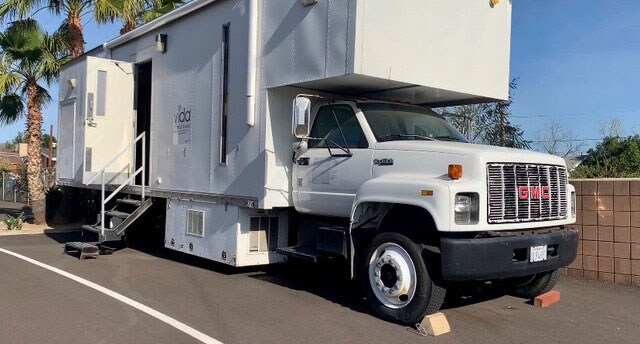
The mobility of the clinic allows healthcare to come to patients, making it more easily accessible for those who may not have reliable transportation.
The stigma associated with being an uninsured patient is often that they are undocumented too. But, according to Rugamas, that’s simply not the case. Kaiser Family Foundation reported in 2019 that more than three quarters of the 28.9 million nonelderly uninsured were US-born and naturalized citizens. Only 23% were not American citizens.
“We were seeing people across the board, people who had worked in high positions at massive companies, that needed to be seen but didn’t have insurance,” she adds. An estimated 12.7 million people lost health insurance provided by their employer between March and May of 2020 (the start of the pandemic), making the opening of Vida Mobile Clinic even more necessary.
Seeing as so many of their patients are Latinx and Spanish speaking, as well as often being undocumented and afraid to speak out about health concerns, Rugamas and Ruiz-Peña want to make their patients feel at home. They’re often reminded of their own parents when caring for their patients.
At the clinic, they are hoping to shift the narrative surrounding uninsured individuals, as well as improve the experience of marginalized communities as it relates to health services.
Caring for the Uninsured
According to a 2019 study by Kaiser Family Foundation, uninsured adults are over three times more likely than insured adults to have not visited a doctor’s office or healthcare clinic in the past 12 months. Delaying visits to a physician can result in health concerns like high blood pressure, cancer, and more routinely tested-for issues to go unchecked, increasing the likelihood for severe health complications in the long run.
Not surprisingly, affordability, or lack thereof, is the main reason why people go without insurance. The Center for Disease Control and Prevention reported that over 73% of respondents in their 2020 National Health Interview Survey cited cost as the reason they were uninsured.
Vida Mobile Clinic’s purpose is to increase healthcare access and promote healthy living for all individuals, regardless of their socioeconomic status and ability to pay. They’re able to do this through their partnership with Lestonnac Free Clinic, a practice located in southern California that aims “to expand the healthcare safety net to marginalized communities,” as well as with the help of their volunteers.
“We’ve really been trying to build our own network of specialists,” says Cecilia Martinez, the volunteer director at Vida Mobile Clinic. “Specialists that have the same passion that we do and are willing to give free or discounted visits.”
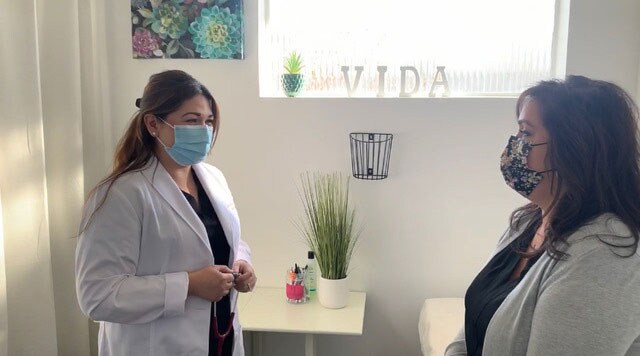
Ana Ruiz-Peña, left, consults with a patient.
At Vida Mobile Clinic, where there is a focus on providing health services to uninsured patients, primary care consultations are free. The clinic also offers low-cost labs, as well as diagnostic testing.
There has been no federal or state funding for Vida Mobile Clinic. According to their GoFundMe page, Rugamas and Ruiz-Peña have been able to pay the costs of rent, electricity, as well as some supplies, but they still rely on private donations. Currently, they pay the rent for their Granada Hills office out of their own pockets.
Volunteering for Something You Believe In
Reports from Data USA show that 93.2% of San Fernando, California, residents are Hispanic. At Vida Mobile Clinic, where many volunteers and donors are the children of Latinx immigrants, it’s especially important for the nonprofit to cater to these patients.
Jessica Ruiz, a donor, told Medscape Medical News “My own parents came here pretty young; they didn’t have health insurance then. There are so many marginalized groups that definitely don’t have access to quality healthcare.”
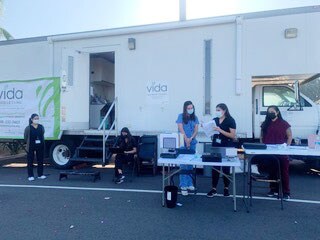
Volunteers working outside Vida Mobile Clinic.
Martinez recalls an instance where a patient came to Vida Mobile Clinic after being handed off from doctor to doctor. “They had thrown her around. And you have to wonder, was it because she didn’t have insurance and couldn’t pay for the MRI or the CAT scan or the other fancy tests? Why did this happen to her?”
Vida Mobile Clinic is also teaching patients that they can ask questions. The fact that most volunteers are fluent in Spanish makes it easier to communicate effectively and efficiently with patients, helping them to trust their healthcare providers. “Ruiz-Peña and Rugamas want patients to be able to advocate for themselves,” says Martinez. “Some patients think they have to take the provider’s word and that’s it.”
Once, as Martinez prepared paperwork for a patient, she recalls the woman bursting into tears. “She was crying because she was so appreciative and so happy that she had found us.”
For that woman and hundreds of others like her, Vida Mobile Clinic has served as a respite where patients can receive healthcare without the fear of not being taken seriously or left in insurmountable debt.
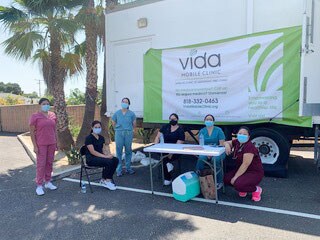
For many volunteers, lending their time to Vida Mobile Clinic is a top priority.
Of course, this wouldn’t be possible without the dedication and vision of Rugamas and Ruiz-Peña, as well as the hard work of the students, donors, and volunteers who make Vida Mobile Clinic possible.
“These volunteers don’t just do Vida. They have jobs, they have school, they have other organizations that they also volunteer for,” Martinez says. “They’re not here because they have extra time. They make it work because they believe in Vida.”
Source: Read Full Article
